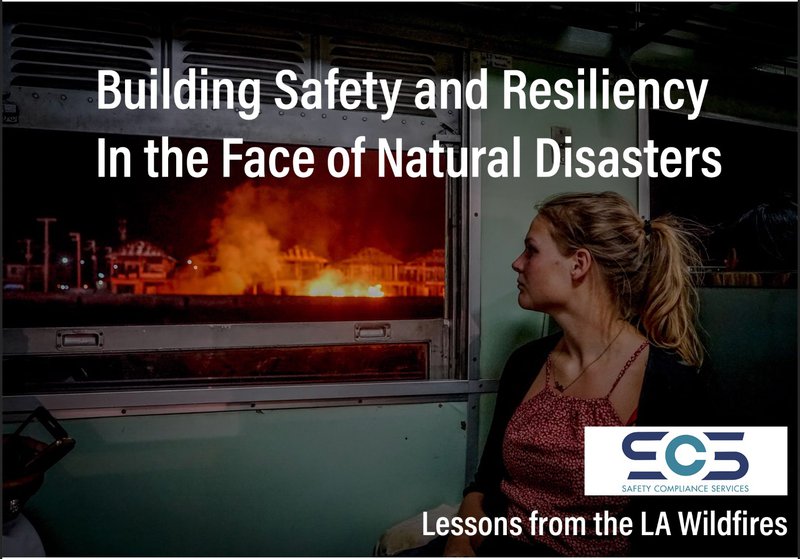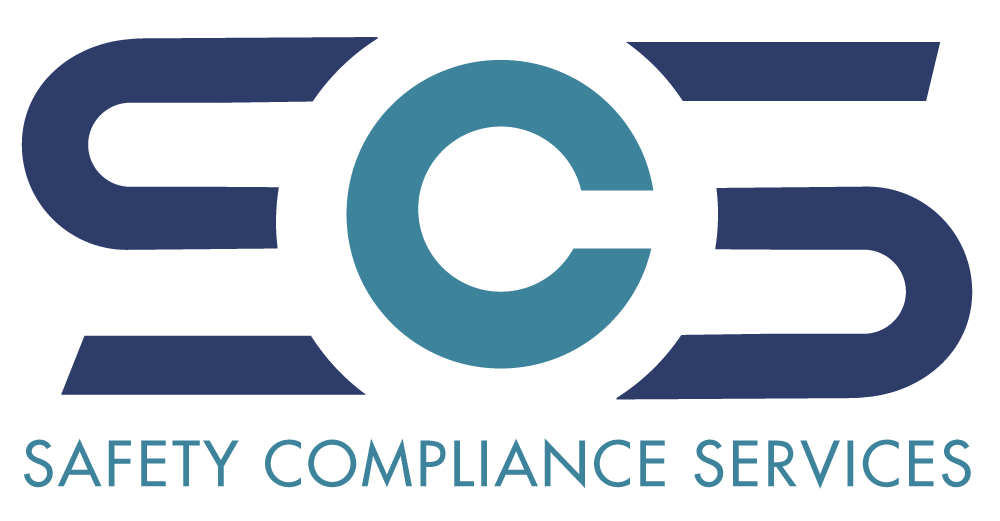
The wildfires sweeping through Los Angeles are a stark reminder of just how quickly natural disasters can upend lives. As smoke fills the air and families evacuate, many people are asking: How can we better prepare for disasters like this?
At Safety Compliance Services, we believe that real safety means building resilience, supporting strong communities, and being ready for the unexpected. Whether you live in a forest fires-prone region or face other natural disasters like hurricanes, earthquakes, or floods, there are proactive steps you can take today to protect yourself, your employees, and your community.
Step 1: Build a Readiness Plan Before Disaster Strikes
Preparedness doesn’t start when you see smoke on the horizon. It begins long before, with simple but effective strategies that can reduce risks and improve survival.
- Know Your Region’s Risks: Wildfires may not be a major concern where you live, but every area faces its own challenges—flooding, hurricanes, tornadoes, or extreme heat/droughts. Research the most common disasters in your area and prepare accordingly.
- Create an Evacuation Plan: Identify multiple exit routes from your home or workplace. If you manage a business, make sure employees know where to go and how to communicate if normal lines are down.
- Prepare an Emergency Kit: Stockpile essentials, including:
- Non-perishable food and water (at least three days’ worth).
- First aid supplies and necessary medications.
- Flashlights, batteries, and backup chargers.
- N95 masks (critical for wildfire smoke protection).
- Copies of important documents in a waterproof bag.
- Stay Informed: Sign up for emergency alerts and learn how to track real-time air quality reports and evacuation orders. Sites like AirNow.gov provide updated AQI levels so you can assess smoke risks in the atmosphere and take steps to minimize health effects.
Step 2: Strengthen Community Resilience
Community support and connection are essential to disaster recovery, helping people rebuild faster and with greater resilience.
In the aftermath of large wildfires, hurricane, or flood, you might notice something remarkable—people helping one another, often before official aid arrives. This is community resilience in action. It's the neighbor checking in on the elderly couple down the street. The local restaurant donating food to displaced families. The community center organizing rides for those without transportation.
Why Community Resilience Matters
Research shows that communities with strong social ties recover faster from disasters. After the 2011 Great East Japan Earthquake, for example, elderly survivors who had deep connections in their neighborhoods reported fewer cognitive and emotional challenges during recovery.
We often think of emergency preparedness in terms of physical supplies, but social capital—the strength of relationships and networks—is just as important. The more connected we are, the better we can mobilize resources, coordinate evacuations, and support one another.
Ways to Build Resilience Today:
- Get to Know Your Neighbors. Introduce yourself, exchange contact information, and talk about emergency plans. A simple conversation today could make all the difference in a crisis.
- Find Local Resource Networks. Mutual aid groups, faith-based organizations, and neighborhood associations often provide food, shelter, and financial assistance in times of need. Knowing who they are before disaster strikes ensures quicker access to support.
- Support Small Businesses and Local Farmers. The businesses that sustain communities in good times are often the first to step up during a crisis. Investing in local economies strengthens long-term resilience.
- Volunteer with Emergency Response or Relief Efforts. Whether through disaster relief organizations, food banks, or neighborhood response teams, giving time and skills to your community builds trust and preparedness.
💡 Imagine what’s possible if we all committed to being a little more connected. What if, instead of waiting for disaster to strike, we actively worked to create stronger, more resilient communities every day?
Step 3: Employers Play a Critical Role in Disaster Safety
Wildfires also affect workplaces, employees, and businesses. Employers have a responsibility not only to keep their teams safe but to contribute to overall community preparedness.
In California, Cal/OSHA requires that employers take steps to protect workers from wildfire exposure/smoke when the AQI for PM2.5 exceeds 151. This includes:
- Monitoring air quality daily and notifying employees of risks.
- Providing N95 respirators and encouraging their use (mandatory when AQI exceeds 500).
- Adjusting work environments when air quality becomes hazardous, including allowing remote work when possible.
For more information, visit Cal/OSHA’s Wildfire Smoke Standards.
This isn’t just a wildfire issue. The recent flooding in North Carolina is another reminder that disasters happen nationwide. Whether facing extreme weather or severe wildfires, employers must prioritize safety—not just for compliance, but because they are part of the community. The better prepared businesses are, the more resilient their workforce and local economy will be.
Final Thoughts: A Call to Connect
Wildfire risks are increasing, but so is our ability to prepare. Time and time again, communities prove that our greatest resource in times of crisis is each other.
When disasters strike, we don’t just rebuild homes—we rebuild trust, relationships, and the very fabric of our communities. And the best time to start? Before the next emergency.
So today, take one step toward connection. Say hello to your neighbor. Learn more about local mutual aid groups. Support a small business. Because when we invest in our communities, we’re not just preparing for the worst—we’re creating the conditions for a stronger, safer, and more resilient future.
For more tips and resources, visit our website or reach out to our team. Let’s create safe spaces—together.
#wecreatesafespaces #wildfirepreparedness #communityresilience #naturaldisasterpreparedness #wildfireexposure #wildfirerisks
